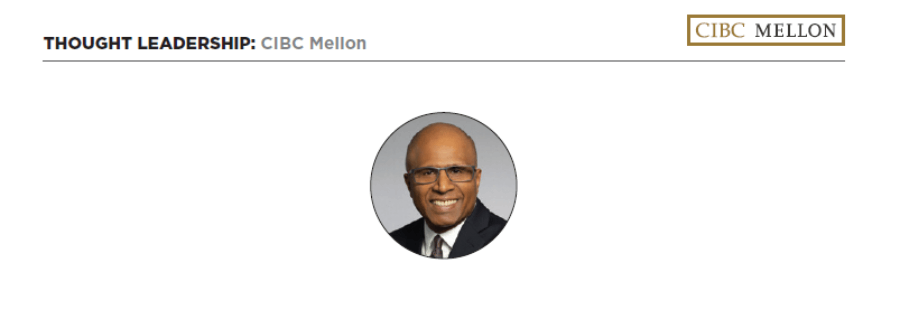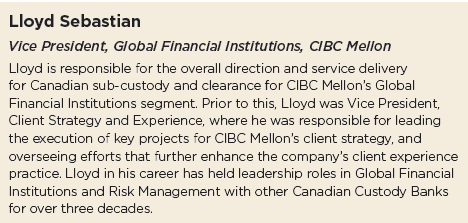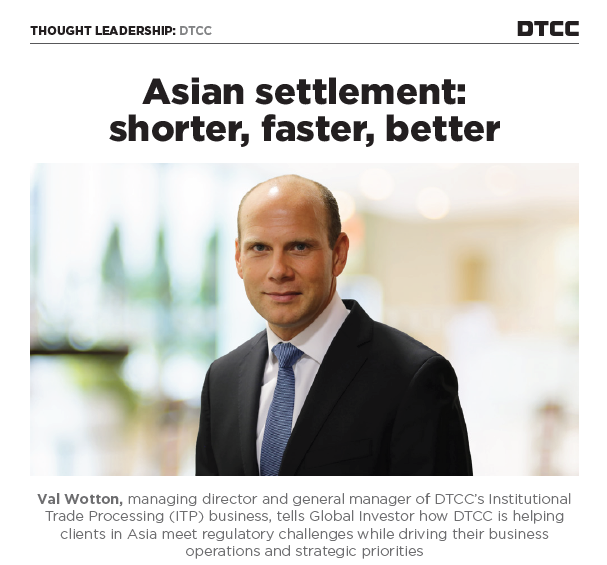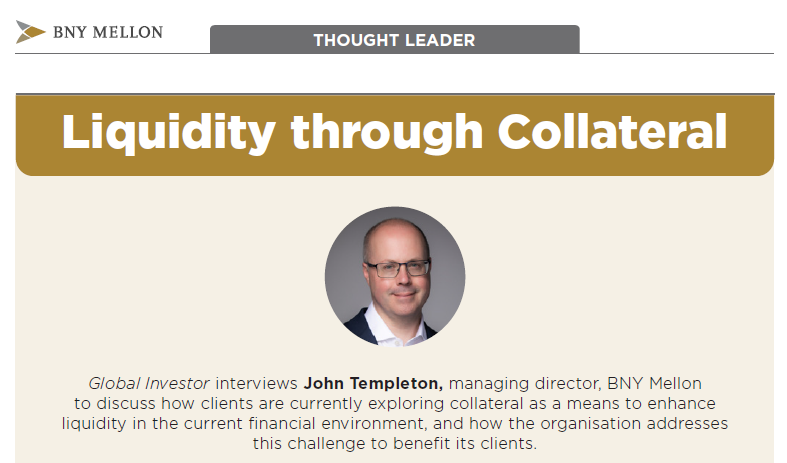Core Focus: CIBC Mellon's Lloyd Sebastian discusses Canada's developing financial landscape
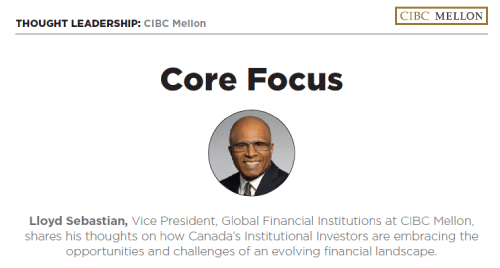
Core Focus
Lloyd Sebastian, Vice President, Global Financial Institutions at CIBC Mellon, shares his thoughts on how Canada’s Institutional Investors are embracing the opportunities and challenges of an evolving financial landscape.
This Thought Leadership article is part of the 2022 Autumn Magazine, which can be accessed here.
Market volatility is affecting markets globally and in many different ways. How is it impacting Canada and how are you navigating it as an organisation?
I would start by saying that from a regulatory perspective, Canada tends to embrace high innovation with high governance. Over the years, our strength, stability and prudent regulatory environment has helped us navigate through periods of market volatility.
Canada’s financial markets have shared in the significant disruption triggered by the COVID-19 pandemic, lingering market volatility, supply chain issues and geopolitical outlook. More specific to us, Canada has also had to contend with a volatile real estate market which has contributed to some additional pressures on the broader economy.
On a more microeconomic level, banks have announced their most recent quarterly results and it is notable that some have increased their loan loss provisions. As we look to the future, questions around inflationary pressures and cost containment strategies remain.
These are some of the headwinds Canadian market participants will be focused on and will likely navigate in the next 12 to 18 months.
That being said, because of the fast-moving nature of the markets, institutional investors are looking for timely access to relevant and resilient data in support of their decision-making through these challenges.
Organizations are investing time, money and energy in ensuring the quality, accessibility and security of their data. How are they maintaining this as data needs are constantly evolving? What does this mean for the governance of their data?
For many institutional investors, technology is viewed as a range of solutions and expertise rather than a single choice imposed by a vendor. The support of robust analytical tools can also be beneficial on the front lines of risk management.
Data quality, availability and accessibility stand as the enduring challenges of data management. These factors are at the forefront of considerations for institutional investors as they receive varied demands from agents, including compliance officers, accountants and risk managers, as well as the operational requirements of portfolio management and trade processing systems. The support of robust analytical tools can also be beneficial on the front lines of risk management.
In parallel, a number of market participants are looking at outsourcing across multiple functions. They want to focus on building scale in their core operations and remove non-core business functions from their day-to-day activities.
From a data perspective, if you tie all these things together, operating within a decentralised model and working with multiple data points can be challenging. As a service provider, we help bring in standardised best practices to ensure data is accessible at all times and in a unified form. In keeping with our global enterprise, CIBC Mellon enables an open architecture approach designed to provide institutional investors with the flexibility to choose best-in-class systems for their investment activities.
The concept of creating a single data source, which standardizes and stores data from multiple providers and enables them to make informed and timely decisions is gaining traction among many investors.
Organizations continue to invest time, money, and energy in ensuring the quality, accessibility and security of their data – and asking fundamental questions about how to maintain this as data needs are constantly evolving. This has increased the need for a very robust governance framework and enhanced strategic management of their data. This may mean a team dedicated to supporting the data needs across the organization - and gathering the requirements of who needs what data and what rules must be applied - to ensure the data is fit for its purpose.
Clients want uncompromised integrity of their data, and at the same time, accurate and timely accessibility to this data. How do you marry all these three things? It can be a challenge, but the governance, security and integrity of the data are absolutely non-negotiable – that is the bottom line. The building blocks of today’s business and operating models are based on this premise.
Can you speak to some of the key regulatory changes in Canada and their impact on your operations post-Covid?
I can speak to two primary areas where I see Canadian regulators taking an active interest.
The first is environmental, social and governance (ESG) disclosure requirements, and Canada is not unique when it comes to this. This thematic is becoming more prominent in many places. There are variations in ESG methodologies, frameworks, and reporting, which can be scarce or inconsistent. Institutional investors and market stakeholders in Canada are aware of the need to achieve consistency, shared standards and best practices. Investors continue to demand transparency on ESG issues and are looking for additional investment options that may lead to positive ESG outcomes.
Another area is digital assets, and specifically, how they can work in a traditional asset servicing world. The digital asset space continues to shift rapidly, as regulatory clarity improves with respect to the financial services available to support the integration between digital assets and broader markets. 2022 saw Canada step into the digital asset economy globally, with the launch of the first exchange-traded bitcoin and ether funds making those asset classes more easily available to both retail and institutional investors.
Canada’s Office of the Superintendent of Financial Institutions
What can the industry and service providers do better when it comes to outsourcing?
Institutional investors embrace a diversity of approaches and have varying needs across their core focus areas.
Institutional investors look to their custodians’ service teams for local insights, a consultative service experience, and to proactively explore new solutions to help clients achieve their goals. In that sense, CIBC Mellon is embracing opportunities for innovation and looking to our clients to advise on the areas where we can better serve them. They have cost constraints and imperatives to build more efficiencies, so they have to carefully weigh their options. Do they want to build a solution internally or do they want to leverage an external solution that is designed in a controlled way using a third-party provider?
How has CIBC Mellon managed to work through the ever-present competitive race for talent?
The race for talent has proven to be a challenge not only in the financial services industry but across multiple sectors in the global economy as well.
CIBC Mellon’s focus is on attracting talent with a long-term perspective in mind. This includes recruiting and retaining the best and the brightest in the industry. We aim to build and reinforce an engaged employee culture that is collaborative and insightful and puts clients at the centre of everything we do.
CIBC Mellon’s employee experience is built on empowering individuals to make a positive impact in their work and in their communities. Alongside our overall philosophy of attracting, retaining and motivating employees, we also foster a sense of community engagement and participate in a wide range of charitable activities as part of our corporate social responsibility program.
Found this useful?
Take a complimentary trial of the FOW Marketing Intelligence Platform – the comprehensive source of news and analysis across the buy- and sell- side.
Gain access to:
- A single source of in-depth news, insight and analysis across Asset Management, Securities Finance, Custody, Fund Services and Derivatives
- Our interactive database, optimized to enable you to summarise data and build graphs outlining market activity
- Exclusive whitepapers, supplements and industry analysis curated and published by Futures & Options World
- Breaking news, daily and weekly alerts on the markets most relevant to you


